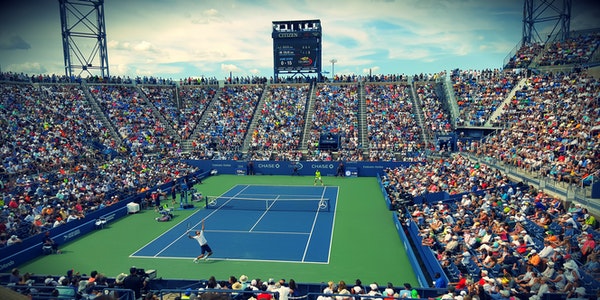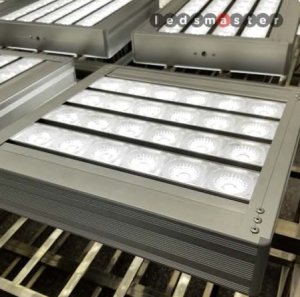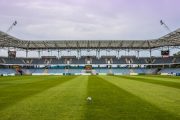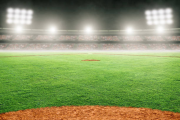There are so many types of international sports standards that it is impossible to list them all. This article lists the more popular sports and international sports standards with a wide range of influence. For other standards, please refer to the “Sports Lighting Design Manual”.
★FIFA Standard
The latest FIFA standard is the 2011 edition of FIFA “Football Stadium”, in which Chapter 9 is venue lighting. See [Table 1] for the lighting standard values of the football field.
| Competition level | Calculate the orientation | Horizontal illumination | Vertical illuminance | light source | |||||||
| Eh | Illumination uniformity | Ev | Illumination uniformity | CCT | CRI | ||||||
| lx | U1 | U2 | lx | U1 | U2 | Tcp (K) | RA | ||||
| NO TV Broadcast | I | Training and entertainment | 200 | / | 0.5 | / | / | / | >4000 | ≥65 | |
| II | League and club games | 500 | / | 0.6 | / | / | / | >4000 | ≥65 | ||
| III | Domestic competition | 750 | / | 0.7 | / | / | / | >4000 | ≥65 | ||
| TV Broadcast | IV | Domestic competition | Fixed camera | 2500 | 0.6 | 0.8 | 2000 | 0.5 | 0.65 | >4000 | ≥65 |
| Field camera | 1400 | 0.35 | 0.6 | >4000 | ≥65 | ||||||
| V | International competition | Fixed camera | 3500 | 0.6 | 0.8 | 2000 | 0.6 | 0.7 | >4000 | ≥65 | |
| Field camera | 1800 | 0.4 | 0.65 | >4000 | ≥65 | ||||||
Note: [Table 1] Standard value of lighting for football field
①The illuminance value in the table is the maintenance illuminance value;
②Ev is the vertical illuminance in the direction of the fixed camera or the field camera. The handheld camera and the rocker camera are collectively called the field camera;
③The glare value in each grade of venue should be GR≤50;
④ The maintenance factor should not be less than 0.7;
⑤It is recommended to use constant lumen technology.
It should be noted that this standard has always been compiled by developed countries in football, and the level and system of football matches in these countries are very complete. The level III “domestic competition” in the table is close to China’s “professional competition”; the level II “league and club competition” is a low-level competition, similar to China’s “amateur competition, professional training”.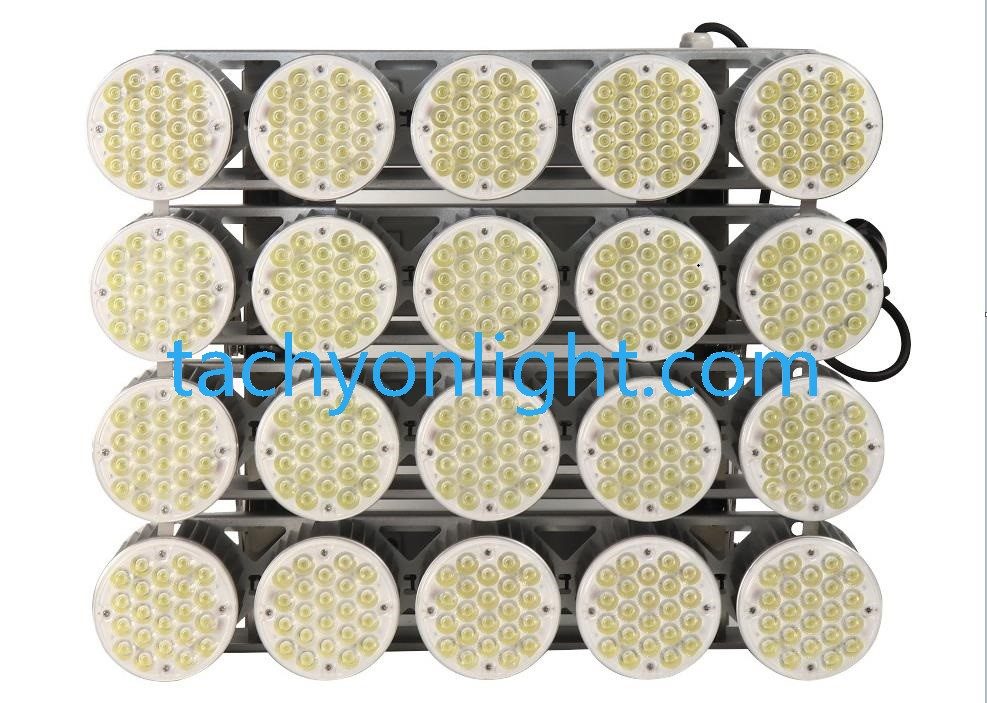
★IAAF Standard
The latest standard of the International Athletics Federation IAAF was promulgated in 2008, which is the 2008 edition of the IAAF Track and Field Facilities Handbook. Section 5.1 is about venue lighting. See [Table 2] for the lighting standard values of its track and field venues.
| Competition level | Calculate the orientation | Horizontal illumination | Vertical illuminance | light source | |||||||
| Eh | Illumination uniformity | Ev | Illumination uniformity | CCT | CRI | ||||||
| lx | U1 | U2 | lx | U1 | U2 | Tcp (K) | RA | ||||
| NO TV Broadcast | I | Training and entertainment | 75 | 0.3 | 0.5 | / | / | / | >4000 | ≥65 | |
| II | League and club games | 200 | 0.4 | 0.6 | / | / | / | >4000 | ≥65 | ||
| III | Domestic,International competition | 500 | 0.5 | 0.7 | / | / | / | >4000 | ≥65 | ||
| IV | Domestic,International competition/TV Emergency | Fixed camera | / | / | / | 1000 | 0.4 | 0.6 | |||
| TV Broadcast | V | Important International competition | Slow motion camera | / | / | / | 1000 | 0.5 | 0.7 | >5500 | ≥90 |
| Field camera | 1400 | 0.5 | 0.7 | >5500 | ≥90 | ||||||
| Mobile camera | / | / | / | 1000 | 0.3 | 0.5 | >5500 | ≥90 | |||
| Terminal camera | 2000 | ||||||||||
Note: [Table 2] Lighting standard values of track and field venues
① The glare value in each grade of venue should be GR≤50;
② For the finish camera, U1 and U2 within 5m before and after the finish line should not be less than 0.9;
③The illuminance value in the table is the minimum maintained average illuminance value, and the initial illuminance value should not be lower than 1.25 times the illuminance value in the table.
Similar to football, the international track and field standards are also compiled by developed countries in Europe and the United States, and all levels of track and field competitions are relatively complete. Although the level III “domestic and international competition” in Table 2 is not broadcast on TV, it is a professional competition, which is close to the level of China’s “professional competition”; the level II “club competition” is also a low-level competition, which is an amateur competition. , Similar to China’s “amateur competition, professional training” level.
★Tennis court lighting standards
The lighting requirements for tennis courts of the International Tennis Federation are shown in Table 3.
| Tennis court lighting standards for fitness and entertainment | ||||||||||||||
| classification | Eh (lx) |
Eh Evenness | GR max | CRI(Ra) | CCT (K) | |||||||||
| U1 | U2 | |||||||||||||
| PPA | TPA | PPA | TPA | PPA | TPA | |||||||||
| Outdoor | normal | 150 | 125 | 0.3 | 0.2 | 0.6 | 0.5 | 50 | ≥20(65) | 2000 | ||||
| high-ranking | 300 | 250 | 0.3 | 0.2 | 0.6 | 0.5 | 50 | ≥20(65) | 2000 | |||||
| Indoor | normal | 250 | 200 | 0.3 | 0.2 | 0.6 | 0.5 | 50 | ≥65 | 4000 | ||||
| high-ranking | 500 | 400 | 0.3 | 0.2 | 0.6 | 0.5 | 50 | ≥65 | 4000 | |||||
| Outdoor tennis court lighting standards | ||||||||||||||
| classification | Eh (lx) |
Ev (lx) |
Eh Evenness | Ev Evenness | CCT(K) | |||||||||
| U1 | U2 | U1 | U2 | |||||||||||
| PPA | TPA | PPA | TPA | PPA | TPA | PPA | TPA | PPA | TPA | PPA | TPA | |||
| Training | 250 | 200 | / | / | 0.4 | 0.3 | 0.6 | 0.5 | 2000 | |||||
| Domestic competition | 500 | 400 | / | / | 0.4 | 0.3 | 0.6 | 0.5 | 4000 | |||||
| International competition | 750 | 600 | / | / | 0.4 | 0.3 | 0.6 | 0.5 | 4000 | |||||
| Camera distance | 25m | / | / | 1000 | 700 | 0.5 | 0.3 | 0.6 | 0.5 | 0.5 | 0.3 | 0.6 | 0.5 | 4000/5500 |
| 75m | / | / | 1400 | 1000 | 0.5 | 0.3 | 0.6 | 0.5 | 0.5 | 0.3 | 0.6 | 0.5 | 4000/5500 | |
| HDTV | / | / | 2500 | 1750 | 0.7 | 0.6 | 0.8 | 0.7 | 0.7 | 0.6 | 0.8 | 0.7 | 4000/5500 | |
Note: Recommended values for tennis court lighting parameters of the International Tennis Federation (Table 3)
① GR≤50. Ra≥65, color TV/HDTV/movie broadcasting is best Ra≥90, color temperature Tk=5500K.
② The numbers in parentheses in the table are the best values.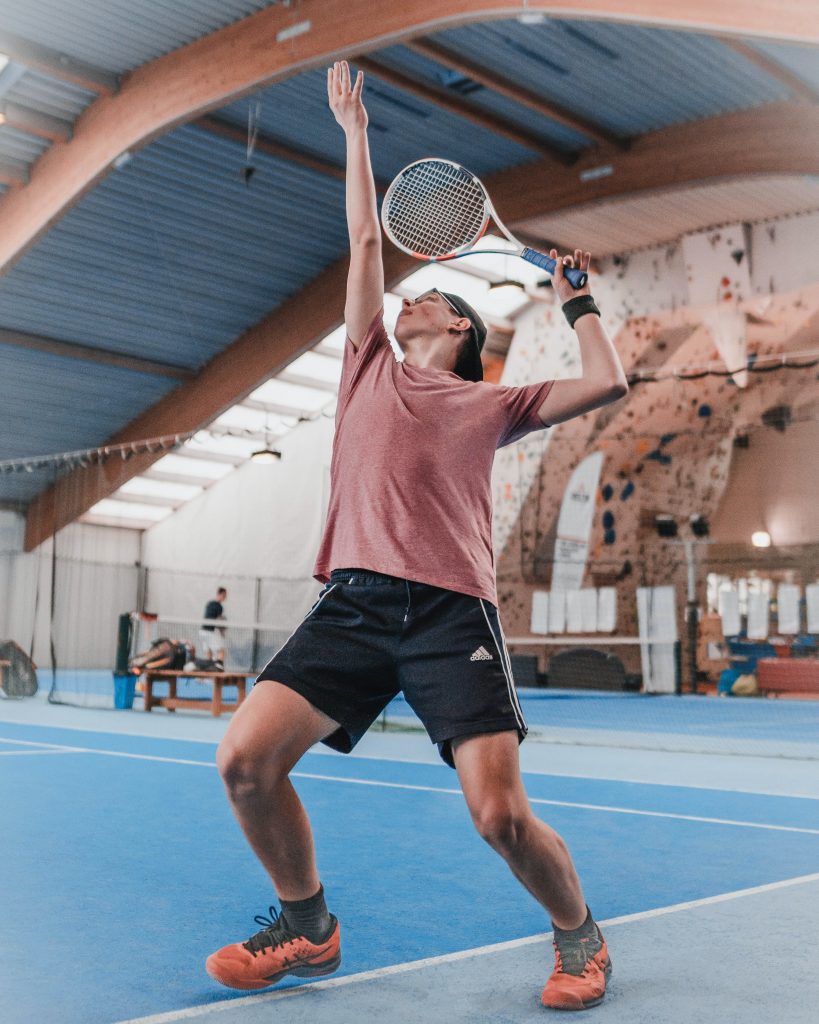
★FIBA lighting standards
The standard promulgated by the International Basketball Federation (FIBA) in 2004-“Official Basketball Rules 2004, Basketball Equipment”, the lighting requirements are shown in Table 4.
| Competition level | Illuminance (lx) | Illumination uniformity | Light source chromaticity parameters | ||||
| Camera type | Eave | U.G%2m | U1 | U2 | CCT(K) | CRI(Ra) | |
| Level I | Slo-moEcam FOV | 1800 | 5 | 0.5 | 0.7 | 3000≤Tk≤6000K | Ra≥90 |
| SDTV Ecam FOV | 1400 | 5 | 0.5 | 0.7 | |||
| HORIZONTAL | 1500-3000 | 5 | 0.6 | 0.7 | |||
| Level II | SDTV Ecam FOV | 1400 | 5 | 0.5 | 0.7 | 3000≤Tk≤6000K | Ra≥90 |
| HORIZONTAL | 1500-2500 | 5 | 0.6 | 0.7 | |||
| Level III | Ecam FOV | 1000 | 10 | 0.5 | 0.6 | 3000≤Tk≤6000K | Ra≥80 |
| HORIZONTAL | 1000-2000 | 10 | 0.6 | 0.7 | |||
Note: [Table 4] FIBA lighting standards. Slo-mo means a slow motion camera with triple speed; SDTV means a standard camera; for SLR cameras, the best color temperature is 5500K~6000K. Ecam-the illuminance in the direction of the camera, FOV-the coverage of the camera, Eave-the average illuminance, U.G-the illuminance gradient.
★Olympic swimming, diving and other standards
The lighting standards for Olympic swimming competitions are shown in [Table 5].
| location | Illuminance (lx) | Illumination uniformity | ||||
| Ev-cam-min | Eh-ave | horizontal direction | Vertical direction | |||
| Emin/Emax | Emin/Eave | Emin/Emax | Emin/Eave | |||
| Playing field | 1400 | See ratio as below | 0.7 | 0.8 | 0.6 | 0.7 |
| All competition area | 1400 | See ratio as below | 0.6 | 0.7 | 0.4 | 0.6 |
| quarantine area | See ratio as below | 0.4 | 0.6 | |||
| Auditorium C1 camera | See ratio as below | 0.3 | 0.5 | |||
|
Ratio |
||||||
| Eh-ave-FOP/Ev-ave-Cam-FOP | ≥0.75 & ≤0.5 | |||||
| Eh-ave-deck/Ev-ave-Cam-deck | ≥0.5 & ≤2.0 | |||||
| FOP calculates the ratio of the maximum and minimum Ev of the four planes of the point | ≥0.6 | |||||
| Ev-ave-spec/Ev-ave-Cam-FOP | ≥0.1 & ≤0.25 | |||||
| Ev-min-TRZ | ≥Ev-ave-C#1-FOP | |||||
|
Uniformity gradient |
||||||
| UG-FOP | <20% | |||||
| UG-Deck | <10% | |||||
| UG Auditorium | ≤20% | |||||
|
Light Source |
||||||
| CRI | Ra≥90 | |||||
| CCT | 5600K | |||||

